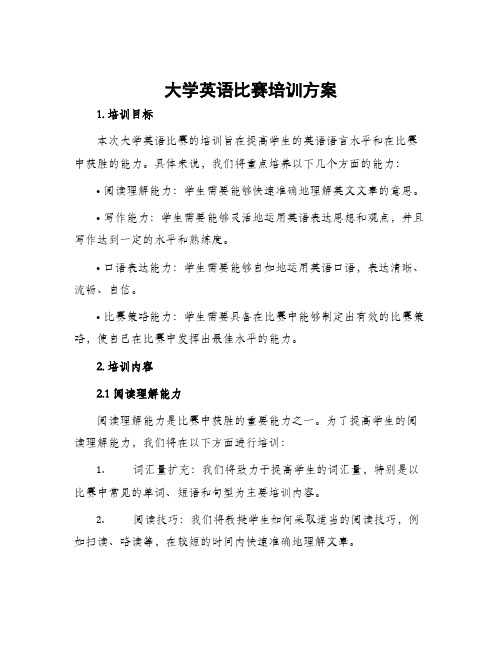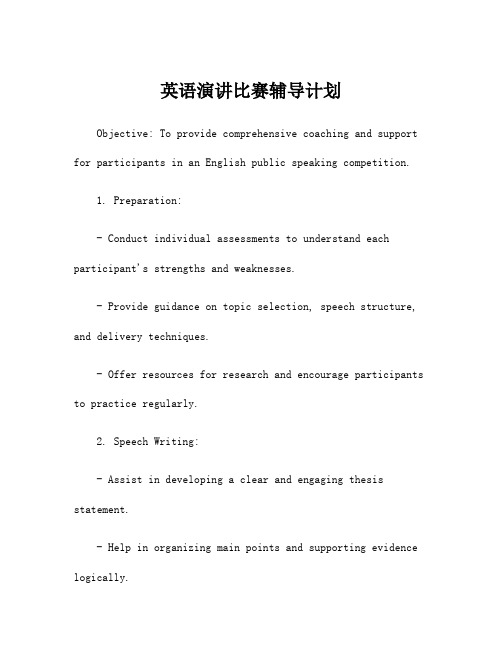英语演讲比赛选手选拔培训计划
小学英语演讲比赛活动方案

小学英语演讲比赛活动方案活动目标本次小学英语演讲比赛活动的目标是提高学生的英语口语表达能力,培养他们的自信心和演讲能力,并促进他们对英语学习的兴趣和参与度。
活动内容1. 报名阶段:- 宣传活动:通过校内海报、校内广播等途径宣传比赛活动,并鼓励学生积极参与。
- 报名方式:学生通过填写报名表格或在指定时间内向老师报名参加比赛。
2. 初赛阶段:- 主题选择:学生可以自由选择演讲主题,鼓励他们选择与自身经历、兴趣相关的主题。
- 演讲准备:学生在指导老师的帮助下,准备一份2-3分钟的英语演讲稿。
- 初赛评选:由学校英语教师组成的评委团对学生的演讲进行评选,选出优秀的演讲者晋级决赛。
3. 决赛阶段:- 演讲技巧培训:为决赛选手组织专门的演讲技巧培训,帮助他们提升演讲的表达能力和语言流利度。
- 决赛筹备:决赛选手根据初赛的反馈意见,对演讲稿进行修改和完善,并进行多次排练。
- 决赛评选:由专业英语教师和外教组成的评委团对决赛选手的演讲进行评选,选出优胜者并颁发奖项。
4. 活动收尾:- 颁奖典礼:在全校师生面前举行颁奖典礼,表彰获奖学生并鼓励他们的努力和成就。
- 经验总结:组织参赛学生和老师进行经验总结和分享,以便今后更好地组织类似活动。
活动安排- 报名时间:XX月XX日至XX月XX日- 初赛时间:XX月XX日- 决赛时间:XX月XX日- 颁奖典礼:XX月XX日志愿者招募为了顺利开展此次活动,我们需要招募一些热心的志愿者协助工作,包括宣传推广、活动组织、评委协助等。
欢迎对英语教育有兴趣的老师、学生和家长积极报名参与,共同为学生的英语学习活动贡献力量。
以上为小学英语演讲比赛活动方案,希望通过此次活动能够激发学生对英语学习的热情,提高他们的英语口语能力,培养他们的自信心和演讲能力。
谢谢!。
大学英语比赛培训方案

大学英语比赛培训方案1. 培训目标本次大学英语比赛的培训旨在提高学生的英语语言水平和在比赛中获胜的能力。
具体来说,我们将重点培养以下几个方面的能力:•阅读理解能力:学生需要能够快速准确地理解英文文章的意思。
•写作能力:学生需要能够灵活地运用英语表达思想和观点,并且写作达到一定的水平和熟练度。
•口语表达能力:学生需要能够自如地运用英语口语,表达清晰、流畅、自信。
•比赛策略能力:学生需要具备在比赛中能够制定出有效的比赛策略,使自己在比赛中发挥出最佳水平的能力。
2. 培训内容2.1 阅读理解能力阅读理解能力是比赛中获胜的重要能力之一。
为了提高学生的阅读理解能力,我们将在以下方面进行培训:1.词汇量扩充:我们将致力于提高学生的词汇量,特别是以比赛中常见的单词、短语和句型为主要培训内容。
2.阅读技巧:我们将教授学生如何采取适当的阅读技巧,例如扫读、略读等,在较短的时间内快速准确地理解文章。
3.阅读练习:我们将为学生提供大量的阅读材料和阅读练习,让学生通过不断练习提高自己的阅读理解能力。
2.2 写作能力写作能力也是比赛中获胜的重要能力之一。
为了提高学生的写作能力,我们将在以下方面进行培训:1.写作技巧:我们将教授学生一些常见的写作技巧,例如如何开头、如何展开、如何结尾等,使学生的写作更加流畅和连贯。
2.语法讲解:语法是英语写作中一个非常重要的方面。
我们将对一些常用的语法点进行详细解释和讲解,帮助学生更好地运用语法。
3.写作练习:通过大量的写作练习,帮助学生培养英语写作的能力和熟练度。
2.3 口语表达能力口语表达能力是比赛中取得好成绩的关键之一。
为了提高学生的口语表达能力,我们将在以下方面进行培训:1.口语练习:在练习中通过帮助学生克服害怕和紧张,培养其流利、清晰地表达英语的能力。
2.学习句型和口语方法:使学生掌握口语单词和短语,并掌握如何使用和结合英文短语,使其英语口语更加地自然。
3.如何在准备答案之前少数不断的说话和思考,使其表达能力更加的流畅。
英语演讲比赛活动方案

英语演讲比赛活动方案1. 活动背景英语演讲比赛是为了促进学生英语口语能力的提升,培养其表达能力、自信心和演讲技巧而举办的活动。
此次比赛旨在激发学生对英语学习的兴趣,提高他们的英语口语表达能力。
2. 活动目标• 提高学生英语口语表达能力和自信心。
• 培养学生的演讲技巧和表达能力。
• 促进学生之间的交流和互动。
3. 活动内容3.1 比赛类型• 初赛:学校内部选拔赛,每班选派代表参加。
• 决赛:初赛脱颖而出的选手参加的校内决赛。
3.2 比赛形式• 单人演讲:每位选手准备一篇英语演讲稿,主题自选,时间不超过5分钟。
• 分组评分:由评委对选手的表现进行评分,评分分为内容、表达和表现三个方面。
3.3 比赛流程• 报名阶段:学生报名参加比赛,提交演讲稿。
• 初赛阶段:根据演讲稿进行初赛选拔,确定决赛选手。
• 决赛阶段:决赛选手进行现场演讲,评选出优胜者。
4. 资源需求• 比赛场地:学校礼堂或多功能厅。
• 演讲设备:麦克风、音响设备等。
• 奖品及证书:优胜者奖品和获奖证书。
5. 宣传推广• 海报宣传:校园内张贴比赛海报,宣传比赛信息和报名方式。
• 校园广播:通过学校广播宣传比赛相关信息。
• 社交媒体:在学校官方社交媒体平台上发布比赛通知。
6. 安全与风险控制• 确保比赛场地和设备安全,避免意外发生。
• 比赛过程中保持秩序,避免混乱局面发生。
7. 时间安排• 报名时间:XX月XX日至XX月XX日。
• 初赛时间:XX月XX日。
• 决赛时间:XX月XX日。
8. 组织团队• 活动策划组:负责活动方案的制定和宣传推广。
• 评委团:由英语老师和资深演讲者组成,负责评选比赛结果。
• 后勤保障组:负责比赛现场布置和设备维护。
9. 活动评估• 通过参赛选手的表现和参与度评估活动效果。
• 收集学生和老师的反馈意见,为下一届活动改进参考。
特殊应用场合及条款1. 学校跨校区比赛1.场地协调:确保比赛场地符合跨校区比赛的需求,包括容纳人数和设备支持。
英语演讲比赛培训计划

英语演讲比赛培训计划English: In order to prepare students for an English speech competition, a comprehensive training plan should be implemented. This plan should include regular practice sessions focusing on various aspects such as speech content, delivery, body language, and overall presentation skills. Students should be encouraged to select topics that they are passionate about and are relevant to the audience. They should also be given guidance on how to structure their speeches effectively, engage with the audience, and make their presentations memorable. In addition to individual practice, group feedback sessions should be organized to provide constructive criticism and help students improve their speech performance. It is also important to incorporate activities that build confidence and reduce stage fright, such as impromptu speaking exercises and mock competitions. Finally, dedicated coaching and mentorship from experienced speakers can offer valuable insights and guidance to students throughout their training process, helping them refine their skills and prepare for the competition with confidence.中文翻译: 为了为学生准备英语演讲比赛,应该实施一项全面的培训计划。
英语演讲比赛培训计划

英语演讲比赛培训计划Public speaking is an art that combines the personal touch of a storyteller with the precision of a teacher. It is a critical skill for leaders and individuals who wish to influence their audience, advocate for a cause, or simply tell their story. The journey to becoming a compelling speaker is one of continuous learning and practice. This document outlines a training plan designed to prepare individuals for an English speech competition, focusing on developing the skills necessary to deliver a powerful and persuasive speech.Understanding the Basics。
Before diving into the nuances of public speaking, it is essential to grasp the basics. This includes understanding the structure of a speech, which typically consists of an introduction, body, and conclusion. Each part plays a pivotal role in the overall delivery. The introduction sets the stage, capturing the audience's attention and presenting the topic. The body is where the main points are elaborated, supported by evidence and anecdotes. The conclusion ties everything together, reinforcing the central message and leaving a lasting impression.Voice and Diction。
英语演讲比赛辅导计划

英语演讲比赛辅导计划Objective: To provide comprehensive coaching and support for participants in an English public speaking competition.1. Preparation:- Conduct individual assessments to understand each participant's strengths and weaknesses.- Provide guidance on topic selection, speech structure, and delivery techniques.- Offer resources for research and encourage participants to practice regularly.2. Speech Writing:- Assist in developing a clear and engaging thesis statement.- Help in organizing main points and supporting evidence logically.- Review drafts and provide feedback on content, coherence, and style.3. Delivery Skills:- Focus on voice projection, intonation, and pacing.- Practice body language, eye contact, and gestures for effective communication.- Conduct mock presentations and offer constructive criticism for improvement.4. Overcoming Nervousness:- Teach relaxation techniques and breathing exercises to manage anxiety.- Encourage positive self-talk and visualization to build confidence.- Provide strategies for handling unexpected situations and maintaining composure.5. Rehearsal:- Schedule practice sessions to refine speeches and receive peer feedback.- Emphasize the importance of timing and fluency in delivery.- Conduct dress rehearsals to simulate the competition environment and boost participants' confidence.6. Handling QA:- Train participants to anticipate potential questions and prepare thoughtful responses.- Encourage active listening and clarity in answering queries.- Offer tips on elaborating on key points and engaging with the audience during the question-and-answer session.7. Support and Encouragement:- Provide ongoing encouragement and motivation throughout the coaching process.- Foster a supportive environment for participants to share experiences and seek advice.- Celebrate achievements and progress, no matter how small, to boost morale.By following this coaching plan, participants will be well-equipped to deliver compelling and confident speeches in the English public speaking competition.。
英语比赛培训计划

英语比赛培训计划Introduction:Competitions are an excellent way for students to showcase their skills and talents while also learning important life skills such as teamwork, time management, and perseverance. To help our students prepare for upcoming academic, athletic, and artistic competitions, we have designed a comprehensive training program that will provide them with the necessary tools and resources to succeed.Objectives:The primary objective of this training program is to prepare students for competitions by improving their skills, confidence, and knowledge in their respective fields. The program will focus on developing key competencies such as critical thinking, problem-solving, creativity, and teamwork.Training Content:The training program will consist of the following components:1. Subject-specific Training:This component will focus on enhancing students' knowledge and skills in their respective fields of competition. Whether it is mathematics, science, debate, athletics, art, or music, students will receive specialized training from experienced coaches and instructors.2. Skill Development Workshops:In addition to subject-specific training, students will also participate in skill development workshops designed to improve their critical thinking, problem-solving, and communication skills. These workshops will be interactive and will include activities, case studies, and group discussions.3. Mock Competitions:To simulate the competition environment, students will participate in mock competitions that closely resemble the real thing. This will allow them to practice under pressure and receive constructive feedback from their coaches and peers.4. Time Management and Stress Management:Competitions can be stressful, and it is important for students to learn how to manage their time effectively and cope with stress. Therefore, training sessions on time management and stress management will be part of the program.5. Team Building Activities:For team-based competitions, students will engage in team building activities to improve their teamwork, communication, and leadership skills. These activities will help students understand the importance of cooperation and collaboration.6. Mental and Physical Conditioning:For athletic competitions, students will receive training in mental and physical conditioning to enhance their performance and endurance. This may include exercises, drills, and sports psychology techniques.Training Methodology:The training program will employ a variety of methodologies to cater to different learning styles and preferences. These may include:- Lectures and presentations- Hands-on activities and experiments- Group discussions and brainstorming sessions- Role-playing and simulations- Demonstrations and practical exercises- Peer coaching and feedback sessions- Interactive multimedia resourcesDuration and Schedule:The training program will be conducted over a period of several months, with a flexible schedule to accommodate students' academic commitments and other activities. Sessions will be held during after-school hours and on weekends to ensure maximum participation.Evaluation and Feedback:To monitor students' progress and ensure that the training program is effective, regular evaluations will be conducted. Coaches and instructors will provide feedback to students, and opportunities for self-reflection and improvement will be incorporated into the program.Conclusion:By participating in this comprehensive training program, students will be better prepared to excel in their respective competitions. They will gain valuable skills and knowledge that will not only serve them well in the competition but also in their future endeavors. We believe that with the right training and support, our students will be able to achieve great success in their chosen fields of competition.。
大学生英语竞赛培训计划

大学生英语竞赛培训计划IntroductionThe goal of the College Student English Competition Training Plan is to provide comprehensive training for college students who are interested in participating in English competitions. The plan includes various aspects of English language learning, such as listening, speaking, reading, writing, and test-taking strategies. The training plan is designed to help students improve their English language skills, build confidence, and achieve success in English competitions.Training ObjectivesThe main objectives of the training plan are:- To improve students' listening and speaking skills in English.- To enhance students' reading and writing abilities in English.- To build students' confidence in using English in a competitive setting.- To provide students with effective test-taking strategies for English competitions. Training ContentThe training plan includes the following content:1. Listening and Speaking Skills- Weekly listening practice sessions to improve comprehension skills.- Oral communication exercises to develop speaking fluency and accuracy.- Debate and discussion activities to enhance students' argumentative skills in English.2. Reading and Writing Abilities- Reading comprehension exercises to improve students' reading skills.- Writing workshops to develop students' composition and essay writing skills.- Vocabulary and grammar exercises to enhance students' language proficiency.3. Test-Taking Strategies- Practice tests and mock competitions to familiarize students with the format and style of English competitions.- Strategies for time management and test preparation to help students perform well in competitive settings.Training MethodsThe training plan utilizes a variety of teaching methods, including:- Interactive lectures and presentations to deliver course content.- Group activities and discussions to encourage active participation and collaboration.- Individual and group projects to enhance students' critical thinking and problem-solving skills.- Role-playing and simulations to provide real-life communication practice.Training ScheduleThe training plan is divided into three phases, each consisting of 10 weeks.Phase 1: Listening and Speaking Skills (Weeks 1-10)- Weekly listening practice sessions- Oral communication exercises- Debate and discussion activities- Mid-term assessmentPhase 2: Reading and Writing Abilities (Weeks 11-20)- Reading comprehension exercises- Writing workshops- Vocabulary and grammar exercises- Mid-term assessmentPhase 3: Test-Taking Strategies (Weeks 21-30)- Practice tests and mock competitions- Strategies for time management and test preparation- Final assessmentIn addition to the structured training schedule, students are encouraged to engage in self-study and practice outside of the classroom.Assessment and EvaluationStudents will be assessed and evaluated at regular intervals throughout the training plan. Assessments will include:- Written tests to evaluate students' language skills and knowledge.- Oral presentations and discussions to assess students' speaking skills.- Participation and attendance to monitor students' engagement and progress.At the end of each phase, students will receive feedback and recommendations for improvement. The final assessment will determine students' readiness and preparedness for English competitions.ConclusionThe College Student English Competition Training Plan is designed to provide students with the knowledge and skills they need to excel in English competitions. By focusing on listening, speaking, reading, writing, and test-taking strategies, the training plan aims to equip students with a well-rounded English language proficiency. With dedication and hard work, students can build confidence and achieve success in English competitions.。
- 1、下载文档前请自行甄别文档内容的完整性,平台不提供额外的编辑、内容补充、找答案等附加服务。
- 2、"仅部分预览"的文档,不可在线预览部分如存在完整性等问题,可反馈申请退款(可完整预览的文档不适用该条件!)。
- 3、如文档侵犯您的权益,请联系客服反馈,我们会尽快为您处理(人工客服工作时间:9:00-18:30)。
英语演讲比赛选手选拔培训计划
为了配合本学期教务科提出的培训英语演讲选手的要求,结合我校学生英语实际水平,现计划做好以下工作:
一、培训项目:英语演讲
二、培训对象:10春幼师班冯润芳、10秋服装班吴海丽,其余的待选拔
三、培训时间:从第五周开始,逢周一、二、四的第七节课
四、培训地点:教学楼一楼多媒体教室
五、培训目标:锻炼最大胆的发言,锻炼最大声的说话,锻炼最流畅的演讲。
六、培训内容:
(自我激励誓言:我一定要最大胆地发言,我一定要最大声地说话,我一定要最流畅地演讲。
)
一)、积极心态训练
1、自我暗示:每天清晨默念10遍“我一定要最大胆地发言,我一定要最大声地说话,我一定要最流畅地演讲。
我一定行!今天一定是幸福快乐的一天!”(平常也自我暗示,默念或写出来,至少10遍。
)
2、想象训练:至少5分钟想象自己在公众场合成功的演讲,想象自己成功。
3、至少5分钟在镜前学习微笑,展示自己的手势及形态。
二)、口才锻炼
A、每天至少10分钟深呼吸训练。
B、抓住一切机会讲话,锻炼口才。
1、每天至少与5个人有意识地交流思想。
2、每天大声朗诵或大声讲至少5分钟。
3、每天训练自己“三分钟演讲”一次或“三分钟默讲”一次。
4、每天给亲人、同学至少讲一个故事或完整叙述一件事情。
5、注意讲话时的一些技巧。
a、讲话前,深吸一口气,平静心情,面带微笑,眼神交流一遍后,开始讲话。
b、勇敢地讲出第一句话,声音大一点,速度慢一点,说短句,语句中间不打岔。
c、当发现紧张卡壳时,停下来有意识地深吸口气,然后随着吐气讲出来。
d、如果表现不好,自我安慰:“刚才怎么又紧张了?没关系,继续平稳地讲”;同时,用感觉和行动上的自信战胜恐惧。
e、紧张时,可以做放松练习,深呼吸,或尽力握紧拳头,又迅速放松,连续10次。
C、英语演讲名人名篇节选(背诵)
三)、辅助锻炼
A、每天至少20分钟阅读励志书籍或口才书籍,培养自己积极心态,学习一些技巧。
B、每天放声大笑10次,乐观面对生活,放松情绪。
C、训练接受他人的视线、目光,培养自信和观察能力。
D、培养微笑的习惯,要笑得灿烂、笑得真诚,锻炼亲和力。
E、学会检讨,每天总结得与失,写心得体会。
每周要全面总结成效及不足,并确定下周的目标。
四)、写作能力训练
A、英语高考作文能力训练
B、英语作文常用句型及短语。
